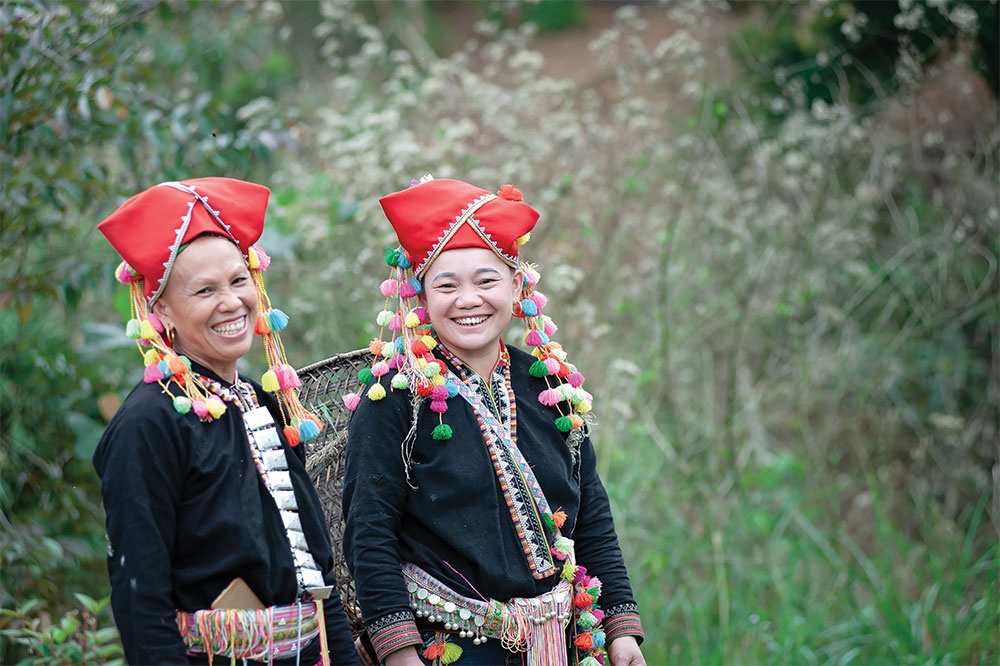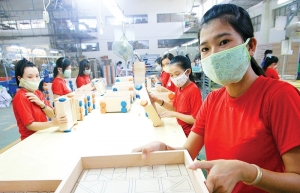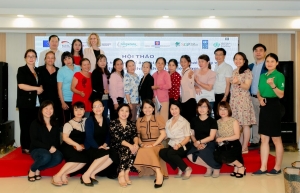Initiatives lift rural female development
The days just before the Lunar New Year are also the busiest days for Cao Thi Tam, director of Tan Xuan Bamboo Shoot Cooperative 269 in Son La province. It is when her cooperative sells the most products, and she can pay the highest wages.
 |
| Initiatives lift rural female development |
Tam is not a native to this land, but her and her family have lived and established a business in Tan Xuan for years. They understand the poverty of the people here, especially among the many ethnic women who have no jobs and limited opportunities.
Tam’s family was always relatively well-off in the area, with income from a grocery store business. However, Tam harboured larger ambitions and wanted to support local people’s economic development to contribute to where her family lives.
“Tan Xuan is a land with rich sources of agricultural materials, including bamboo shoots, but people often do not have enough to eat and wear. Many people go to the forest to dig a few kilograms of bamboo shoots, but are forced to sell low by traders, so their income is only a few tens of thousand of VND per day. This is also why I have to do something to help them,” said Tam.
With her long-term business experience, she bought the bamboo shoots at a higher price than the traders and practised selling them on e-commerce platforms. After having the opportunity to approach many development projects and several non-governmental organisations, she has participated in training courses on model building, sales skills training, and community connection.
With support from Australia’s GREAT (Gender Responsive Equitable Agriculture and Tourism) initiative, Tam established her bamboo cooperative in 2019 with only 12 initial members, operating mainly in the purchasing, preliminary processing, and distribution of products made from local bamboo shoots.
After three years, the cooperative has nearly 100 members – mainly female workers of Thai, H’mong, and Muong ethnic groups – and owns a 1,000 sq.m factory. In addition to the main business of bamboo shoots, it also distributes other local products such as ginger, honey, rice, and sticky wine, to businesses in Hanoi and Ho Chi Minh City.
“People’s incomes have increased to around $220-260 per month. The women who joined the cooperative learned how to do business and received additional soft skills training to become more confident. I feel happy and grateful to have made a small contribution to change their lives,” said Tam.
About 400km from Tan Xuan Cooperative 269 in Lao Cai province, the Red Dao Community Cooperative in Sapa is run by a Dao woman named Tan Ta May.
May said she decided to establish a cooperative five years ago to develop classic products of the Red Dao and to help poor women in the community find jobs and settle down. “When participating in economic development, women will promote their ownership in the family and community while preserving their national cultural identity,” May said.
The cooperative has 120 members and over 200 linked households, mainly growing and processing medicinal plants and herbs, the most prominent of which is a herbal bath formula extracted from more than 70 herbs and sold in the big cities.
Phan Ta May, a member of Red Dao Community Cooperative said, “My family used to grow rice and corn, which could barely make ends meet, but since we shifted to herbs, our income has doubled. We no longer feel insecure about our future. All herbs from this garden are guaranteed to be purchased by the cooperative, which means a stable income is guaranteed.”
These women are typical characters representing thousands of other successful ethnic minority women in Lao Cai and Son La, and Vietnam in general. With the support and advice of domestic and international development organisations, they have made a drastic change from thinking to acting to not only improve their material and spiritual lives, but also help other women in the community to develop.
However, according to the Committee for Ethnic Minority Affairs, less than one-fifth of ethnic minority women have jobs that are paid at these levels.
In addition to limited Vietnamese language and means of transport, the division of labour in the family places too much burden on women’s shoulders. Women from ethnic minority groups have to do unpaid housework for up to nine hours a day, four hours more than Kinh women
Therefore, building a community to grow together and inspire through successful business models to create jobs and empower vulnerable groups of women must be expanded – especially as Vietnam has developed a National Strategy on Gender Equality. It has the goal that by 2025, about 20,000 women will be supported to start a business.
 | Helping small businesses and female entrepreneurs endure After avoiding the worst of the pandemic’s economic impacts for over a year, Vietnam is now facing its worst outbreak. The General Statistics Office reported that retail sales of goods and services fell 20 per cent between last and this July, and in the July supplement to the Asian Development Outlook, the Asian Development Bank lowered its forecast for Vietnam’s economic growth for 2021 from 6.7 to 5.8 per cent. Further downward revisions are likely if lockdowns persist. |
 | Meeting Central Retail Vietnam female leaders VIR had an exclusive chat with three female leaders in Operations, Finance, and Value Creation Departments from Central Retail Vietnam – the country’s leading retail behemoth. Each of them has a unique perspective on women in leadership, despite common misconceptions regarding the gender gap. |
 | Fostering a just and sustainable future for Vietnam’s female waste workers Waste workers remain an integral part of the waste management system in Vietnam’s metropolises, with most of them being informally working women in precarious situations, regularly confronted with pollution and toxic work conditions. A partnership between Vietnamese and overseas organisations seeks to improve the workers’ livelihoods and contribute to a greener future. |
What the stars mean:
★ Poor ★ ★ Promising ★★★ Good ★★★★ Very good ★★★★★ Exceptional
Related Contents
Latest News
More News
- Tet event in Japan celebrates success of 14th National Party Congress (January 25, 2026 | 10:04)
- 14th National Party Congress wraps up with success (January 25, 2026 | 09:49)
- Congratulations from VFF Central Committee's int’l partners to 14th National Party Congress (January 25, 2026 | 09:46)
- List of newly-elected members of 14th Political Bureau announced (January 23, 2026 | 16:27)
- 14th Party Central Committee unanimously elects To Lam as General Secretary (January 23, 2026 | 16:22)
- List of members of 14th Party Central Committee announced (January 23, 2026 | 09:12)
- Highlights of fourth working day of 14th National Party Congress (January 23, 2026 | 09:06)
- Press provides timely, accurate coverage of 14th National Party Congress (January 22, 2026 | 09:49)
- Press release on second working day of 14th National Party Congress (January 22, 2026 | 09:19)
- Minister sets out key directions to promote intrinsic strength of Vietnamese culture (January 22, 2026 | 09:16)

 Tag:
Tag:




















 Mobile Version
Mobile Version